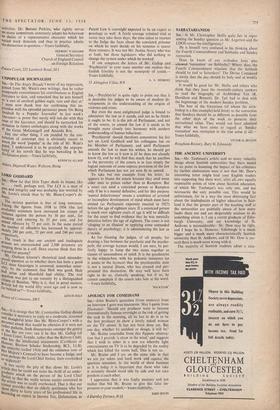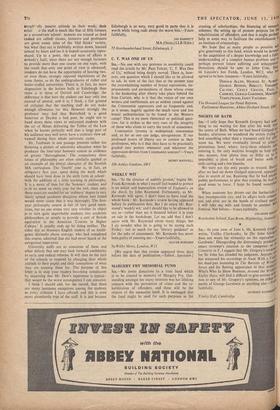THE ANCIENT UNIVERSITY SIR,—Mr. Taubman's' article said so many valuable
things about Scottish universities that there would be no point in lessening the impact of his criticisms by further elaboration were it not that Mr. Dow's interesting letter might lead your English readers into supposing that there were, after all, two equally respectable points of view about Scottish education, of which Mr. Taubman's was only one, and not necessarily the only possible one. This would be unfortunate, for in a way the most distressing fact about the inadeqbacies of higher education in Scot- land is that the greater part of the teaching staff at the universities are painfully aware of how many faults there are and are desperately anxious to do something about it. I am a recent graduate of Edin- burgh University, and my knowledge of St. Andrews is inconsiderable : Mr. Dow may be right, and I hope he is. However, Edinburgh is a Much bigger and a much more characteristically Scottish university than St. Andrews, and (if Mr. Dow is cor- rect) there is much more wrong with it. The majority of Scottish students adopt a cata- ._ etrophrnlly passive attitude to their work; their telati .o the staff is much like that of fifth formers at a second-rate school: lectures are treated as (and indeed are called) classes, lecturers and professors are given comic titles of the 'Old Stinks' variety, but what they say is faithfully written down, learned almost by heart and (so it is hoped) accurately repro- duced. Up to a point, this sad state of affairs is nobody's fault, since there are not enough lecturers to provide more than one course on one topic, with the result that only one point of view is advanced; students do not have the opportunity of hearing two, or even three, strongly opposed expositions of the same theme, as do the undergraduates of richer and better-staffed universities. There is, in fact, no more dogmatism in the lecture halls at Edinburgh than there is in those of Oxford and Cambridge; the difference is that here the student can hear only one instead of several, and it is, I think, a fair ground of criticism that the teaching staff do not make enough allowance for this. However strongly the professor may feel that Butterfield is a good historian or Dryden a bad poet, he ought not to hand down these views to unformed students with the air of Moses delivering the Tables of the Law when he knows perfectly well that a large part of his audience may well never have a contrary view ad- vanced during their whole university career.
Mr. Taubman in' one passage presents rather too flattering a picture of university education when he produces the four-year honours course as evidence of greater 'thoroughness.' The compulsory three terms of philosophy are often similarly quoted as an example of the liberal character of the Scottish MA curriculum. The 'fourth' year is, in fact, an obligatory first year, spent doing the work which should have been done in the sixth form at school : with the addition of a little learning in philosophy. It is a waste of time for the 'honours' student, and is in no sense an extra year for the rest, since only three years are needed for an 'ordinary' degree (a very thinly spread academic discipline whose best friend would never claim that it was thorough). The first- year philosophy course is full of very good inten- tions, but no one seems very sure whether its object is to turn quite improbable students into academic philosophers or simply to provide a sort of British equivalent to the American `Courses in Higher Culture.' It usually ends up by doing neither. The other day an Honours English student of an intelli- gence distinctly above average, who had completed this course, admitted that she had never heard of the - categorical imperative.
University staffs are so conscious of these and other defects that one may look forward confidently to early and radical reforms. It will then be the turn of the schools to respond by changing their whole attitude to their pupils and.their conceptions of what they are training them for. The purpose of this letter is to stop your readers becoming complacent by supposing that Mr. Dow's experience is typical : that would be the worst consequence I can conceive.
I think I should add, for the record, that there are many luminous exceptions among the students to every criticism I have offered; and this is even more abundantly true of the staff. It is just because
Edinburgh is so very, very good in parts that it is worth while being rude about the worst bits.—Yours faithfully,
IAN HAMNETT MA (Oxon.) LLB (Edin.)



































 Previous page
Previous page